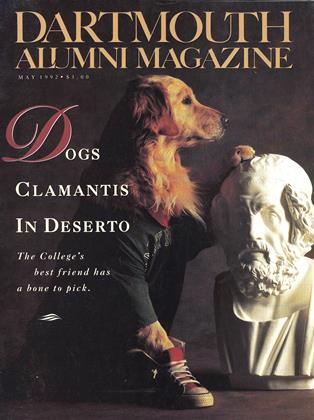1774
In a Commencement oration that College historian Leon Richardson 1900 later described as "puerile and bombastic," John Wheelock praises music as "a Spark, which can inflame the friendly Mind with Sympathy and Compassion; inspire a Lover's Breast with a rising Ardour of Affection; and kindle in the Soul the long Train of tender Emotions."
1851
Students interrupt classroom recitations by blowing their horns outside professors' windows and running away before they can be discovered.
1891
A gushing music critic for The D proclaims that the Bavarian Yodel, a joint effort by the Banjo Club and Glee Club, is "worthy of three encores."
1897
The Dartmouth opines that Richard Hovey's "Men of Dartmouth" will never be sung as a distinctive College song.
1901
Professor Charles Morse teaches the College's first music class, a theory course which requires that students play four-part hymns on the keyboard as a prerequisite to enrollment.
1920
The Barbary Coast Jazz Ensemble is organized under the name "Underwood Embree and his Barbary Coast Five."
1930
A five-piece student or-chestra is standard dinner entertainment in the College Hall Commons.
1949
One undergraduate suggests that Bartlett Hall isn't wholly inadequate for music. He reports that a "faithful steam-pipe" unerringly sounds middle A whenever the heat is turned on.
1965
Comprehensive exams test music majors on their knowledge of 100 famous pieces. Most identify fewer than one-third of the selections.
1974
The first coed glee club tours the Northeast. The Aegis reports that "the girls added a lot to the tour, in the form of new verses for the Rugby songs, people to party with at the parties ..."
1991
The marching band includes two bagpipers, an accordionist, and a corps of kegs and kazoos.
1992
The College recognizes 15 musical ensembles, including four a cappella singing groups and a gamelan orchestra.
RAISING MONEY forthe baseball team was theraison d'être for theseDartmouth musicians.
 View Full Issue
View Full Issue
More From This Issue
-
 Feature
FeaturePARTYING: A PEER REVIEW
May 1992 By John Scalzi -
 Cover Story
Cover StoryDogs Clamantis in Deserto
May 1992 -
 Feature
FeatureINVENTING 101
May 1992 By JIM COLLINS '84 -
 Feature
FeatureOh, You Shouldn't Have!
May 1992 By JONATHAN DOUGLAS -
 Cover Story
Cover StoryA Gallery Of Dogs And Their Presidents
May 1992 -
 Article
ArticleIf Only it Ware Just a Myth
May 1992 By Professor Hans H. Penner







